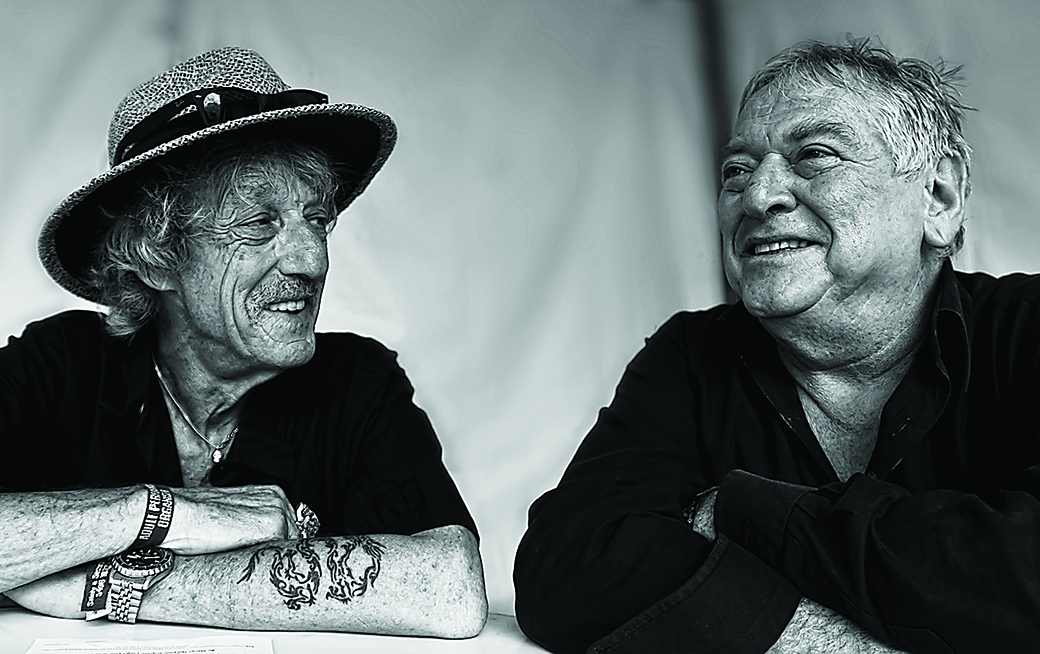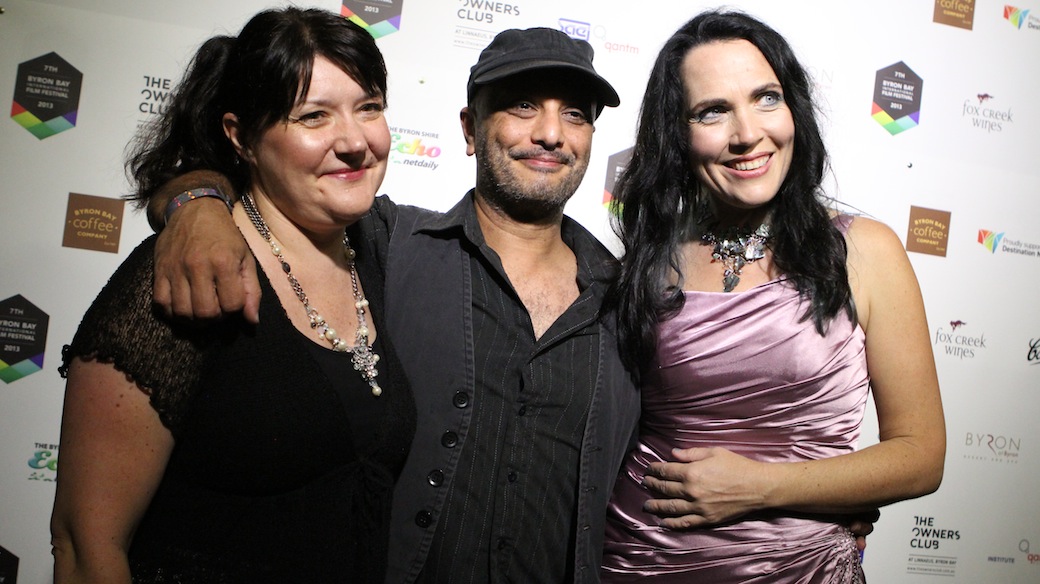
SAM CUTLER | SKIRTING THE LIMELIGHT
According to a recent study conducted by the mighty Microsoft Corporation, the human attention span has dropped from 12 seconds to eight seconds.
We live in a fast-paced world of soundbites, vox pops and sensationalism, a world that devours, masticates and regurgitates a truth misconstrued to the point of fabrication in order to make each one of those eight fleeting seconds count. We cast our eyes across the alarming bold type, carefully crafted to draw maximum attention, and assume that the black and white message conveyed to us by that fountain of truth, the public media, is, well, black and white.
For a man who has been witness to more newsworthy experiences in many a single weekend as most of us will attest to in a lifetime, it is a gross understatement to say that, to be publicly remembered for a falsified account of a single December day in 1969 is a little myopic.
Sam Cutler began life with a bang – literally. Born in London at the height of World War II, he exited the womb right into the aftermath of the blitz. By 1945, both parents would have their lives stolen by the travesty of war and the orphaned Cutler would be ensconced in a new home and a new family almost before he could even walk.
“I was adopted in 1946, when I was a three-year-old, by a very good family, loved and raised by them. They were communists, so I was raised in a very left-wing environment. Basically, I left my home in England when I was 15 to wander the world.”
The next five years alone could account for a biography, the swathe of anecdotes and adventures he doubtlessly encountered and accumulated through his late teens enough to make any paranoid parent’s head spin. But it was on his return to the homeland that his life’s path ventured into tales of cinematic proportions.
Now 1966, London was swinging more than a boomer’s family jewels, and Cutler dived headlong into the thick of it. Enamoured of the music scene during this pivotal era, Sam found any way he could to participate. While most envisioned themselves through their rose-tinted love heart glasses, as the next Lennon, Hendrix, Joplin or Morrison, Sam saw his role in the industry a little differently.
“I just loved music, so I used to hang out in clubs and work out how and where I could play a part. So I helped getting the shows together and slowly kind of moved up the ladder until I was in charge of shows – first small, then larger and so on.
“There was a difference in those days. Now everyone wants to do it, so you’d be competing with thousands of people. At the time that I wanted to do it, everyone wanted to be rock n’ roll stars, they didn’t want to be tour managers or equipment guys or sound men or lighting people. In fact, those roles barely existed. In a way, I was involved at a time when the music business was deciding for itself what kind of business it was actually going to be.”
This formative era opened itself to Cutler, affording him the ability to carve his own niche and present the artists of the time with a skill set and enthusiasm that was, for the greater part, unique.
From the smoky, dingy clubs of London, the only way was up. The Beetles, The Who and the Rolling Stones had all crawled their way out of the basements and into the limelight and Cutler was right by their side, through the trenches and onto the world stage.
“It was the birth of the contemporary music industry. The early ‘60s was a time in England of great creativity in terms of how we were going to make it happen. Everybody was young, and when you’re in your twenties you think you can rule the world.”
The pen of history’s writing was firmly in Cutler’s grasp. Every day was a new awakening, another step in musical evolution, and every gig raised the bench mark once more for everything that would come after it. Pioneers in much that they did, Cutler, the roadies and management and of course the bands themselves were forging new ground continually.
This was the right place, this was the right time and Cutler had had the foresight and passion to be perfectly poised to utilise the opportunity. Event and band management were still a far cry from the professionalism of today’s standards. Cutler recognised this and forged his career from the chaos.
Alexis Korner, ‘the Founding Father of British Blues’, was his first major client, a pivotal and inspirational figure in England’s music scene, and the blues was where it was at. Everyone, from Elvis to the Doors, Pink Floyd to the Stones, was reaching out to the black blues musicians of the US for inspiration and Cutler was on the pulse.
“The hubris of people singing, ‘We Built this City on Rock n’ Roll’…no you didn’t – what a load of bo$%&cks, you know what I mean,” he smirks through his still robust London accent. “The baton was passed well before Elvis and white rock n’ roll and it was actually passed by black artists. One of the things the Rolling Stones did was recognise the roll of black artists and pay tribute to it and copy it in effect. I was into all of that – Big Bill Broonzy and Josh White – all kinds of black, acoustic blues artists. And then the blues moved into Chicago and got electrified and the rest is history.”
Cutler balks at the notion of having a ‘proper’ career, but his association with Korner, producing shows and so on, lead to the management of events in London’s Hyde Park – for Korner and Pink Floyd amongst many of the world’s biggest names in music, before eventually connecting with the Rolling Stones.
“The ‘Stones came to the first Blind Faith show in Hyde Park and they loved it. Mick [Jagger] came with Marianne [Faithful] and asked me how it worked and wanted to know all about it and then decided that they wanted me to do a show in Hyde Park to launch Mick Taylor as the replacement of Brian Jones. Then four days before the show, Brian died, so it turned into a memorial for Brian.”
As if his breaks had not been big enough to that point, this meeting was pivotal in Cutler’s story and, with the ‘Stones in their heyday, he became the band’s manager, both at home in the UK and across the water in America.
“Everybody in the music business in London wanted to go to America, whether it was ‘Floyd, The Who, Mick Fleetwood, whoever. America was the Mecca. It was a different world then and America was where it was at. I took the ‘Stones on the ’69 tour of America. Some of their greatest music was played around that period. When I worked with the ‘Stones, they made Beggar’s Banquet, Let It Bleed and Get Your Ya Yas Out – in my opinion, three of the greatest albums ever made.”
Nothing like it had come before and nothing could equal it after. It was as dynamic, exciting, electric and volatile as the music industry would ever be. But with the highs, there came the lows, and the free concert of Altamont in California was certainly one of rock n’ roll’s darkest moments.
The media says that a black festival-goer was murdered, the media says the Hell’s Angels were responsible, the media says the gig was mismanaged and, in a feast of sensationalism, here-say and conjecture verging on libel, the headlines grossly overlooked the facts.
The reality, so rarely spoken by media lips, was that the reveler had pulled a gun, fire two shots at an unknown target and the threat was neutralised before any more harm could be done, by members and associates of the Hell’s Angels who happened to be in attendance, but had not, in stark contrast to media accusations, been hired.
This echo in Cutler’s past simply won’t stop ringing in his ears, and it is with some very understandable contention that he addresses any mention of Altamont.
And here, in the mispublicised miasma of falsity, is point-perfect of the 8-second attention span of society at large. This misplaced scandal is dragged up from the gutter time and again in the questioning of a man who has accomplished so much more, given so much to the development of the music industry and is now, over 45 years later, fighting a far bigger battle, a battle for his health. Surely this single, miniscule shadow on an iridescent career can be outshined.
He forged the way for live concerts the world over, dropped acid on tour with the Grateful Dead, founded a business that represented The Band, The Allman Brothers and more and, in his 72 years, has lived and become so very much more than the 30 tragic and falsely reported seconds that have plagued him ever since.
Cutler could have the expanded ego of a self-aggrandising rock star, the pseudo-superciliousness of wannabe celebrity, and it would be justified by the part he has played. But his unwavering humility is resonant. He was just a London kid who digged the scene. Looking at the industry now and festivals such as Byron’s Bluesfest – the organiser of which, Peter Noble, is a close friend – Cutler is full of praise and admiration, for the management, the event and the musicians. He could lay claim to any number of features that assist in the smooth running of a festival, but to him, it’s still all about the music.
The London lad is now a Byron Shire local, quick to voice his adoration of Australia, and has no desire to return to the UK:
“I sold it to an American for ten bucks – they can ‘ave it! My mother used to say to me, ‘oh you must miss England,’ and I go, ‘no. Second hand book shops –that’s the only thing I miss about England.”
Living a far more humble life, sipping coffees with his wife and friends rather than sculling vodkas with any number of groupies, Cutler remains connected to the friends he made back in the swinging 60s; Mick, Keith and Charlie.
“I took my kids to see them [The Rolling Stones] in Brisbane and we met up with the band last year. It was lovely and it was a great show. But you can’t pretend you’re twenty anymore, coz you’re not! Personally, I just wish Mick would stand still and sing! But what can you do – he does what he does and he’s still very good at it, that’s for sure. He’s a great frontman.”
I finish my talk with Sam Cutler feeling embarrassed, ashamed to have even suggested the ‘A’ word and wishing to have explored so much more of his fascinating life in lieu of his understandable frustration at the mention of Altamont. His life has been so much more and I hang up, grateful that, though time had lapsed for me to question him further, I could discover his astounding journey in print, hoping that this glimmer into an exceptional life might urge you to do the same.
‘You Can’t Always Get What You Want: My Life with The Rolling Stones, The Grateful Dead and Other Reprobates’ by Sam Cutler is a biographical voyeurism into the rock n’ roll hey day and available now from www.samcutler.org.
– This article first appeared on Common Ground Australia on Jun 1, 2015
You May Also Like

FALLS FESTIVAL 2015 | FALL ON YOUR FEET
September 20, 2015
BUN COFFEE | COOL BEANS
June 2, 2015




